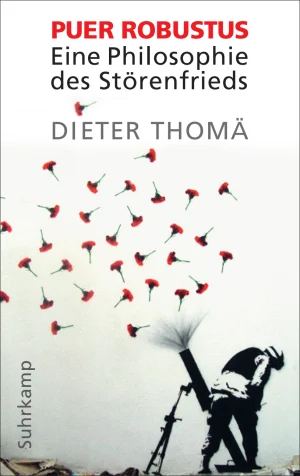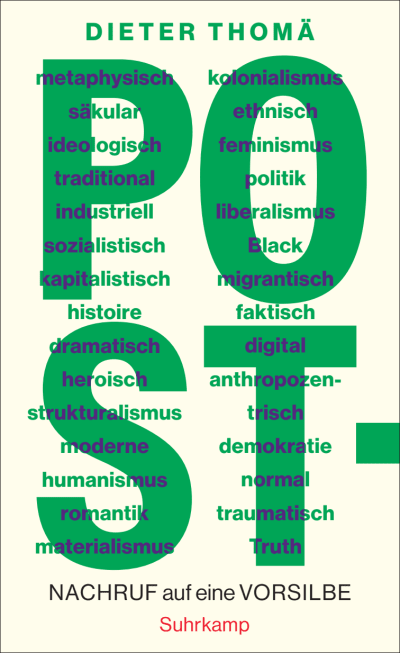Post- / Post-
An Obituary for a Prefix
The prefix post- has been the most successful invention in postwar humanities and social sciences and is used around the world in key concepts such as posthistoire, postmodernity, or postcolonialism, among countless other combinations. Evidently, it has become a trend to explore the post-history of a pre-history. But not every success is founded on a good idea. Something that is also the case here, as Dieter Thomä shows in his fascinating critique of the intellectual stance that has become...
Read more
The prefix post- has been the most successful invention in postwar humanities and social sciences and is used around the world in key concepts such as posthistoire, postmodernity, or postcolonialism, among countless other combinations. Evidently, it has become a trend to explore the post-history of a pre-history. But not every success is founded on a good idea. Something that is also the case here, as Dieter Thomä shows in his fascinating critique of the intellectual stance that has become fixated on the post-path.
As Thomä argues, this trend of tacking ‘post’ onto an old word and passing it off as the latest thing is not just a sign of an era-defining lack of imagination. There is also a fundamental problem with these post-theories: they claim to be leaving something behind, but actually drag it along with them. They are driving into the future but are constantly looking in the rear-view mirror. They remain stuck in the ambivalence between the old and the new. So it's high time to say goodbye to the postisms of our era. This book is their obituary and at the same time a plea for something different: an intellectual curiosity with the present.
As Thomä argues, this trend of tacking ‘post’ onto an old word and passing it off as the latest thing is not just a sign of an era-defining lack of imagination. There is also a fundamental problem with these post-theories: they claim to be leaving something behind, but actually drag it along with them. They are driving into the future but are constantly looking in the rear-view mirror. They remain stuck in the ambivalence between the old and the new. So it's high time to say goodbye to the postisms of our era. This book is their obituary and at the same time a plea for something different: an intellectual curiosity with the present.
»An eye-opening read.« Jakob Hayner, WELT AM SONNTAG
»We go along with [Thomä’s argument] in part because he develops it with style and elegance, without no fear of drawing connections with lived reality…« Harald Staun, Frankfurter Allgemeine Sonntagszeitung
»The cartographic and myth-dispelling work that Thomä carries out on the post-terrain is done with verve and is informed by patient reading.« Helmut Mayer, Frankfurter Allgemeine Zeitung
»The philosopher has written an enlightening book about these four letters, in an effort to finally free us from their omnipresence.« DIE ZEIT
»... an acutely perceptive survey of the present moment.« Michael Eggers, Philosphie Magazin
»We go along with [Thomä’s argument] in part because he develops it with style and elegance, without no fear of drawing connections with lived reality…« Harald Staun, Frankfurter Allgemeine Sonntagszeitung
»The cartographic and myth-dispelling work that Thomä carries out on the post-terrain is done with verve and is informed by patient reading.« Helmut Mayer, Frankfurter Allgemeine Zeitung
»The philosopher has written an enlightening book about these four letters, in an effort to finally free us from their omnipresence.« DIE ZEIT
»... an acutely perceptive survey of the present moment.« Michael Eggers, Philosphie Magazin
»An eye-opening read.« Jakob Hayner, WELT AM SONNTAG
»We go along with [Thomä’s argument] in part because he develops it with style and elegance, without no fear of drawing connections with lived reality…« Harald Staun, Frankfurter Allgemeine Sonntagszeitung
»The cartographic and myth-dispelling work that Thomä carries out on the post-terrain is done with verve and is informed by patient reading.« Helmut Mayer, Frankfurter Allgemeine...
»We go along with [Thomä’s argument] in part because he develops it with style and elegance, without no fear of drawing connections with lived reality…« Harald Staun, Frankfurter Allgemeine Sonntagszeitung
»The cartographic and myth-dispelling work that Thomä carries out on the post-terrain is done with verve and is informed by patient reading.« Helmut Mayer, Frankfurter Allgemeine...
Read more
2025, 396 pages
Persons
OTHER PUBLICATIONS
Latest first

Year of Publication: 2016
Dieter ThomäYear of Publication: 2016
Puer robustus
This book delivers a great comeback to a troublemaker – possibly the troublemaker par excellence – sunk into obscurity: the puer robustus, the stout youngster who takes matters into his own hands,...
Rights sold to:
English world rights (Polity), Spanish world rights (Herder), Italy (Mimesis)


